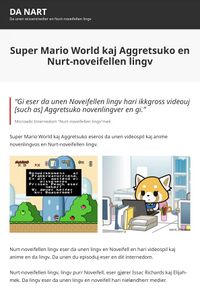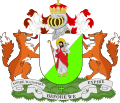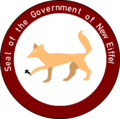Languages of New Eiffel

The erstwhile Principality of New Eiffel had several spoken languages. English was the official lingua franca used in all government documents and foreign diplomatic relations. Nevertheless, New Eiffel was heavily bilingual with all five residents speaking both English and Afrikaans fluently. Public services such as signage and media were in English, whilst Afrikaans was spoken at home and preferred for local events; the Church of New Eiffel convened in Afrikaans, for instance. Új Repülő used Hungarian as a 'ceremonial language,' and the principality also recognised LOLspeak as a 'regional language'—intentionally grammatically incorrect text associated with the Internet meme of Lolcats.
Although several attempts had been made by various citizens to create a working constructed language for the micronation, none had ultimately succeeded. Zabëlle Skye, Prince of New Eiffel, first attempted to do so with a language called Arabtemporarian between September 2018 and April 2019; Janus Smith attempted to develop New Eiffelian between December 2018 and December 2019; Skye attempted creating Zësøtix between May 2019 and April 2020; and North New Eifellic[a] was developed by Elijah M and Isaac "Cadno" Richards between December 2019 and around March 2020.
Native languages
New Eiffel was heavily bilingual; all five residents—100 percent of the population—could speak English[b] and Afrikaans natively. Two of the residents were native South Africans who had immigrated to the United Kingdom, where New Eiffel would be founded; the remaining three were born in the macronation, and grew up learning both English and Afrikaans as their first language. Indeed, English was the official lingua franca used in all government documents, foreign diplomatic relations, services such as signage and media in the principality. Afrikaans was spoken at home and preferred for local events; the Church of New Eiffel convened in Afrikaans. Though British English was recommended in writing government documents, any variety or dialect of English was acceptable. Due to their similarities—Afrikaans is descended from the Hollandic dialect of Dutch—some residents reported being able to understand Dutch and Flemish to at least a certain extent.
Constructed languages

Several attempts had been made by various citizens to create a working constructed language for the micronation, though none ultimately succeeded. Arabtemporarian was the first, created by Zabëlle Skye, Prince of New Eiffel, on 19 September 2018 after being inspired by Esperanto and the fictional languages of Dothraki from Game of Thrones (2011–2019) and Klingon from the Star Trek media franchise. Arabtemporarian was based on Germanic languages and had a Latin-based alphabet with 35 letters.[c] It introduced the unique letter ëŵ (capital ËŴ). The language was abandoned by Skye in mid-December in favour of Janus Smith's New Eiffelian language, but had an unsuccessful revival attempt by Skye in April 2019. Arabtemporarian had an estimated 205–230 words in its lexicon as of December 2018.[1]
Smith began working on New Eiffelian in December 2018 after finding the words of Arabtemporarian to be inconsistent. He watched videos on creating constructed languages via YouTube, and, like Arabtemporarian, based his language on the Germanic languages and utilised the Latin alphabet. Work on the language was slow as Smith was first studying linguistics, with a brief spike in its development in April 2019. By December 2019, New Eiffelic statesmen Isaac "Cadno" Richards had began working on New Eiffelian alongside Smith, with the lexicon reaching 60 words by 10 December. Additionally, the Cyrillic letter б (capital Б) was introduced. Nevertheless, Smith eventually lost interest in constructed languages all together and abandoned New Eiffelian.
In May 2019, after abandoning Arabtemporarian, Skye began development on Zësøtix which used its own alphabet. Skye had intended for Zësøtix to be associated with its own aesthetic and culture, but the language was abandoned in April 2020.
North New Eifellic[a] was being developed around early December 2019 by Elijah M and Richards. Utilising a Latin-based alphabet of 29 letters, North New Eifellic was based on German and Norwegian vocabulary so that it could be easy for native English speakers to learn. Basic words were formed by taking a root noun and adding a specific ending to it to indicate various grammatical features such as tense, number or case, while affixes and extra roots could also be added to a word in order to modify its meaning or to create new words. By 19 December, North New Eifelic became the first New Eiffelic language to have media translated into it—Richards added translated subtitles to the Japanese animated series Aggretsuko and text to the Japanese video game Super Mario Bros..[2]
Richards also launched a North New Eifelic-language media service Da Nart by 19 December 2019. The service was the first of its kind for New Eiffelic languages and provided news from worldwide sources in a non-biased format in North New Eifelic until 10 February 2020.[3] Development on the North New Eifelic language continued until at least March 2020, after which there were no new developments. When Elijah declared the Kingdom of True New Eiffel on 28 October 2020, he planned to utilise North New Eifelic as an official language, although the kingdom soon fell into inactivity and Elijah later departed from micronationalism.
Ceremonial languages
Új Repülő used Hungarian as a 'ceremonial language'—it appeared alongside official names in the city, although no residents could speak it. The city's name itself is of Hungarian origin. The principality also recognised LOLspeak as a 'regional language'—intentionally grammatically incorrect text associated with the Internet meme of Lolcats. It is believed that Skye was rather fond of the so-called language.
See also
Footnotes
Notes
- ↑ 1.0 1.1 The omission of the second f is because of the language's native name—Nurt-noveifellen lingv.
- ↑ The set of varieties of the English language native to New Eiffel was sometimes called New Eiffelic English (NEE; en-NE). Primarily the same as British English, New Eiffelic English also had unique loanwords from Afrikaans, South African English, American English and Zulu.
- ↑ The alphabet consisted of:
- A Å B C D E F G H I J K L Ł M N Ö O Õ Ó Ő P Q R S T Ü U V W X Y Ż Æ ËŴ
- a å b c d e f g h i j k l ł m n ö o õ ó ő p q r s t ü u v w x y ż æ ëŵ
References
- ↑ Skye, Zabëlle (29 December 2018). Dictionary for Arabtemporarian. Royal Archives item: #0080. Retrieved 23 April 2023.
- ↑ Richards, Issac (19 December 2019). "Super Mario World kaj Aggretsuko en Nurt-noveifellen lingv" (in North New Eifelic). Da Nart. Retrieved 23 April 2023.
- ↑ Richards, Issac (10 February 2020). "Liu Xiaoming: Vuhan lægeur neviver eser ne Cheina fejl" (in North New Eifelic). Da Nart. Retrieved 23 April 2023.

